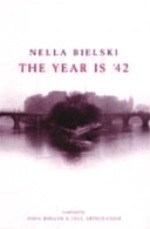|
Book
Review
The Year is '42
Nella
Bielski
Karl Bazinger,
a Wehrmacht officer, a lover of his country but not of its
Führer, feels at home in Paris, where the occupation
does not yet weigh too heavily, but he is beginning to be
aware of the ambivalence of his position. He has friends in
Paris: the Févals, who live in the Place des Vosges,
and the Nallets, with whom he dines every Thursday.
 Here
he has sat opposite Jean Cocteau and Coco Chanel, and enjoyed
stimulating, erudite conversation. Through the Févals
he has met a mysterious Russian princess, who runs a psychiatric
clinic and has been involved in a minor act of sabotage; at
the Nallets he has met a girl, Madeleine, who has become his
lover. Bazinger fears he may be enjoying the last of this
idyll, for he has been warned that the Gestapo knows about
his social life, that some - if not all - of his friends are
suspect, and he may have to choose between abandoning or informing
on them. Here
he has sat opposite Jean Cocteau and Coco Chanel, and enjoyed
stimulating, erudite conversation. Through the Févals
he has met a mysterious Russian princess, who runs a psychiatric
clinic and has been involved in a minor act of sabotage; at
the Nallets he has met a girl, Madeleine, who has become his
lover. Bazinger fears he may be enjoying the last of this
idyll, for he has been warned that the Gestapo knows about
his social life, that some - if not all - of his friends are
suspect, and he may have to choose between abandoning or informing
on them.
The situation
is complicated by the arrival of his old friend and neighbour
from Saxony, Hans Bielenberg, a Luftwaffe officer, the purpose
of whose visit to Paris is unexplained, but which is surely
more substantial than wanting to buy a secondhand book for
his wife's birthday. And why does he carry a cyanide capsule
in his pocket? Bazinger takes Bielenberg with him for dinner
with the Févals, at a bistro run by a woman known as
"the Widow"; it is a meal during which little is
said but much is communicated.
The third
person around whom the novel revolves is a young doctor, Katia
Zvesdny, who lives in Kiev, which is also under German occupation.
When Bazinger is posted to Ukraine, Katia treats him for a
skin inflammation. She lives with her father, a schizophrenic
musician who has brought her up to "follow her soul",
next door to a young art student, whose Jewish grandparents
have been shot at Babi Yar and whose parents are in the camps.
Her own husband is a political prisoner too.
What no
resumé can transmit is the luminosity of this work,
the magic it works on the reader as it draws one into 1942.
All the characters say just enough to let the reader and the
other characters know they have secrets and to be able to
guess how they are linked, which side they are on. Yet they
keep us and one another guessing, because to say everything
would be far too dangerous. It is partly this sense of mystery,
of things not said, fears unvoiced, memories suppressed, that
gives this novel its depth and draws the reader deeply into
its time and place.
It's a
completely unsentimental telling. None of the characters asks
for pity; they try to live as best they can in one of the
most terrible years in European history. Amidst the destruction
of their families and of "normal" life, they establish
human connections where they can, and make the most of simple
pleasures. And the magic is that the reader feels connected
too.
Nella
Bielski was born in Ukraine and studied philosophy at Moscow
University. She now lives in Paris and has written several
novels (all in French), including Oranges for the Son of Alexander
Levy (also translated by Berger and Appignanesi) and After
Arkadia. There is not a word too many in The Year is '42,
and the translators have done a beautiful job. This is one
of those very rare novels that you want to read again as soon
as you've got to the end.
This review was first
published in The Guardian
Copyright
(R) thedailystar.net 2004
|
